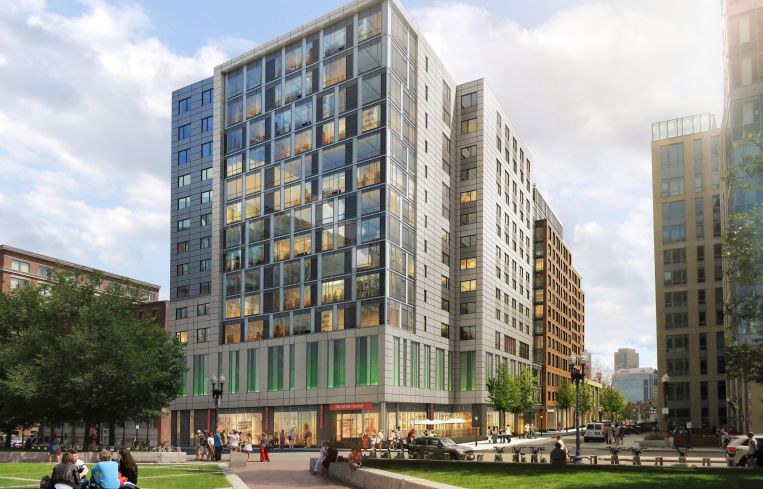Wells Fargo Lends $158M on Related Beal Boston Project
By Danielle Balbi January 8, 2016 1:45 pm
reprints
Related Beal tapped roughly 10 different financing sources to fund a 14-story, $230 million mixed-use development in Downtown Boston, including a $158 million debt and equity package from Wells Fargo.
The sponsors—a partnership formed by Related Companies and the Boston-based Beal Companies in 2013—are constructing a 239-unit below-market-rate rental building totaling 248,000 square feet; an attached 220-key hotel totaling 146,000 square feet; a restaurant and retail space totaling 10,000 square feet; and an above-ground parking garage.
Construction on the one-building mixed-use project began this week and the project is due for completion in 2018.
As part of the financing, which closed late last month, Wells Fargo originated an $85.8 million tax-exempt construction loan on the affordable residential component and a $65 million taxable construction loan on the hotel component.
The project also received $7.6 million in 4 percent Low Income Housing Tax Credits from the federal government, of which Wells Fargo purchased 49 percent, Citigroup purchased 49 percent, and Boston Capital, as a syndicator, purchased the other 2 percent. The Massachusetts’ Department of Housing and Community Development also provided $7.1 million in state LIHTC, which Boston Capital is also syndicating.
Citigroup also provided a $3.6 million subordinate loan to serve as both construction and permanent financing. That loan does not amortize and carries a reduced interest rate.
“We love the hotel financing business, but what really got my group’s interest is the affordable nature of the project,” Duane Mutti, senior vice president of the community lending and investment team at Wells Fargo, told Commercial Observer. “It is bringing much needed affordable to low-, moderate- and middle-income people in Boston, and that’s a large unmet need. Related came up with a very complex financing structure that is delivering much-needed workforce housing.”
Additionally, Related Beal received $3 million from Massachusetts’ Affordable Housing Trust Fund, the Boston Globe reported, while Boston Properties and hospitality and food provider Delaware North contributed $10.5 million. The two firms’ nearby development TD Garden requires a contribution to the city’s affordable housing programs.
Related Beal’s development, dubbed Parcel 1B, sits on a state-owned site, so the developers entered a 99-year land lease with the state of Massachusetts Department of Transportation. The project also received a 121a tax abatement because of its affordable component, meaning that a portion of the taxes on the property will be subsidized for the first 15 years.
“I congratulate the team at Related Beal for reaching this early milestone in redeveloping Parcel 1B,” Boston Mayor Martin Walsh said in a press release announcing that the project’s financing had closed. “They were able to work creatively to secure the financing needed to bring this unique project to fruition, and I look forward to the ground breaking.”
Mr. Walsh is focused on bringing more housing options to the city, through his “Changing City: Boston 2030” plan, which calls for 53,000 new residential units, including 44,000 new workforce housing units, to be built by 2030.
The Parcel 1B development, which is located on Beverly and Causeway Streets in the Bulfinch Triangle, a historic district of Boston, was originally meant to hold 239 affordable- and market-rate units, but the developers changed their plan in April 2015, choosing to make all of the rental apartments below market rate.
Twenty percent of the apartments will house individuals and families earning between 40 and 60 percent of area median income (AMI), while the remaining units will house individuals and families earning between 80 and 165 percent AMI, according to Mr. Mutti and his team at Wells Fargo.
The 2015 AMI in Boston was $68,950 for individuals and $98,500 for families of four. Sixty percent of AMI qualifies as individuals earning $41,350 or less and families of four earning $59,100 or less, while 80 percent of AMI qualifies as individuals earning $55,150 or less and families of four earning $78,800, according to the Boston Redevelopment Authority.
Representatives for Related Beal and Citigroup did not respond to inquiries by time of publication.


